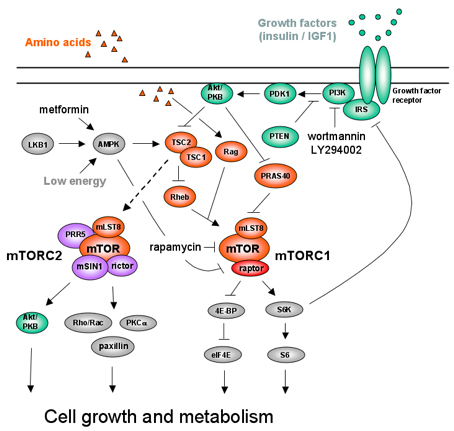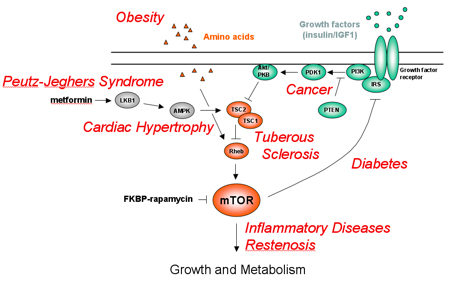Professor Michael N. HALL
Winner of the 2009 Louis-Jeantet Prize for medicine
Biography
The information below refers to the time of the award.
Michael N. Hall was born in 1953 in Puerto Rico (United States). He received his PhD from Harvard University and was a postdoctoral fellow at the Pasteur Institute in Paris and at the University of California in San Francisco. In 1987, he joined the Biozentrum of the University of Basel (Switzerland), where he is currently Professor and Vice-Director. He has produced a number of books on science, and serves on the editorial advisory boards of various scientific journals. He has already received several distinctions, notably the Cloëtta Prize for Biomedical Research.
Research on cell growth
Life is often defined as the ability of an organism to replicate. This replication requires two separate processes which, although often linked together, are nonetheless different: cell growth and cell division (into two daughter cells). While numerous studies have focused, for many years, on the molecular mechanisms that control cell division, those which control cell growth, despite their fundamental importance and clinical relevance, were poorly understood until relatively recently.
The biochemist became a world leader in the field with the early 1990s discovery of the TOR protein and the elucidation of its role as a central controller of cell growth. This protein has moreover survived evolution, as it is found in all eukaryotes, from yeast to human. Michael N. Hall subsequently demonstrated that TOR operates within two larger protein complexes that are structurally and functionally distinct. More recently he was able to show that the TOR pathway in adipose tissue controls energy metabolism and weight gain.
Michael N. Hall’s research could have significant therapeutic implications, as the TOR signalling pathway represents a promising target for the treatment of various disorders. It is estimated that 70% of human cancers are associated with malfunctions of the TOR signalling pathway. The TOR protein is also involved in cardiovascular disease, obesity and diabetes .
Works
TOR signalling and control of cell growth
TOR (Target of Rapamycin) is a highly conserved protein kinase and a central controller of cell growth and metabolism. TOR was originally discovered in yeast but is conserved in all eukaryotes including plants, worms, flies and mammals.
Mammalian TOR (mTOR) controls growth in response to nutrients (e.g., amino acids), growth factors (e.g., insulin, IGF-1), cellular energy (ATP), and stress (hypoxia). TOR activates cell growth by positively and negatively regulating several anabolic and catabolic processes, respectively, that collectively determine mass accumulation. In this context, it is important to note that cell growth refers to an increase in cell size rather than an increase is cell number. An increase in cell number is a result of cell division. Whereas cyclin-dependent kinase(s) is a central controller of cell division, TOR is a central controller of cell growth. The discovery of TOR led to a fundamental change in how one thinks of cell growth. It is not a spontaneous process that just happens when building blocks (nutrients) are available, but rather a highly regulated, plastic process controlled by TOR-dependent signalling pathways. The anabolic processes controlled by TOR include transcription, protein synthesis, ribosome biogenesis, nutrient transport, and mitochondrial metabolism. Conversely, TOR negatively regulates catabolic processes such as mRNA degradation, ubiquitin-dependent proteolysis, autophagy and apoptosis.
TOR is found in two structurally and functionally distinct multiprotein complexes, TORC1 and TORC2 (mTORC1 and mTORC2 in mammals), each of which signals via a different set of effector pathways (figure 1). mTORC1 is composed of raptor, mLST8 and mTOR, and is sensitive to the immunosuppressive and anti-cancer drug rapamycin. Rapamycin, in complex with the intracellular protein FKBP12, binds and inhibits mTORC1 directly. mTORC2 consists of rictor, mSIN1, PRR5, mLST8 and mTOR, and is rapamycin insensitive. The best-characterized phosphorylation substrates of mTOR are S6K and 4E-BP1, via which mTORC1 controls protein synthesis, and Akt/PKB via which mTORC2 controls cell survival and other processes. Like TOR itself, the two TOR complexes and the overall architecture of the TOR signalling network are conserved from yeast to human. Thus, the two TOR complexes constitute an ancestral signalling network conserved throughout eukaryotic evolution to control the fundamental process of cell growth.
While the role of TOR in controlling growth of single cells is relatively well understood, the challenge now is to understand the role of TOR signalling in coordinating and integrating overall body growth in multicellular organisms. To this end, efforts are underway to elucidate the role of mTOR signalling in individual tissues. Recent results demonstrate that mTORC1 in fat tissue controls whole body energy metabolism and weight gain, whereas mTORC1 in skeletal muscle prevents muscle dystrophy. However, the tissue-specific functions of mTOR are largely unknown.
As a central controller of cell growth and metabolism, TOR plays a key role in development and aging, and is implicated in many major diseases including cancer, cardiovascular disease, inflammatory disease, and metabolic disorders (figure 2). Indeed, it has been calculated that mTOR is upregulated in 70% of all tumors. To date, the mTOR-inhibitor rapamycin is used in the clinic for the treatment of allograft rejection, cancer and cardiovascular disease. However, there is potential for rapamycin or new drugs that target mTOR signalling in the treatment of other disorders such as obesity, diabetes and muscular dystrophy. To meet this potential will require further understanding of mTOR signalling

Figure 1. The mammalian TOR signalling network. The overall structure and function of the TOR signalling network are conserved from yeast to human.

Figure 2. Disorders resulting from dysregulation of mTOR signalling.
Contact
Professeur Michael N. HALL
Croissance et Développement
Biozentrum
Université de Bâle
Klingelbergstrasse 50/70
CH – 4056 BÂLE
Tél.: +41 61 267 21 45 (Secrétariat)
Fax: +41 61 267 07 59

